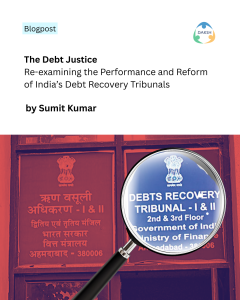

Prevention of Sexual Harassment Policy
POLICY ON PREVENTION OF SEXUAL HARASSMENT AT THE WORKPLACE
A. COMMITMENT
(a) DAKSH is committed to providing a work environment that ensures every employee is treated with dignity and respect and afforded equal and equitable treatment, without any discrimination.
(b) DAKSH is also committed to promoting a work environment that is conducive to the professional growth of its employees and encourages equality of opportunity.
(c) DAKSH will not tolerate any form of sexual harassment and is committed to take all necessary steps to ensure that its employees are not subjected to any form of harassment. Accordingly, any instance of harassment will be taken very seriously and if any employee is found to have committed it, they will be subject to appropriate disciplinary action according to the Policy.
B. POLICY
(a) This is DAKSH’s policy on Prevention of Sexual Harassment at the Workplace (Policy). Though drafted to be compliant with the Sexual Harassment of Women at Workplace (Prevention, Prohibition and Redressal) Act, 2013 (Act) and the Rules made thereunder (Rules), DAKSH intends the Policy to apply to instances of Sexual Harassment (as defined below) irrespective of the gender of the Complainant (as defined below).
(b) DAKSH’s Board of Advisors has unanimously adopted the Policy.
(c) Anything not expressly discussed here shall, particularly where a woman is the Complainant, be dealt with as prescribed in the Act and/or Rules.
C. SCOPE
(a) The Policy applies to all Employees in all locations where DAKSH has offices or conducts business.
(b) The Policy applies to every category of employment with DAKSH, including permanent, probationary, casual, temporary staff, management, trainees, and employees on contract.
(c) The Policy also applies to third parties who engage with DAKSH, its representatives or subsidiaries in the course of a business relationship, including customers, consultants, visitors, vendors and contractors.
(d) That is, all such persons shall not only be afforded protection under the Policy, and have the right to make a Complaint, but shall also be responsible to conform to and comply with the duties and obligations of the Policy, and can be held liable for any violation thereof. Notwithstanding the foregoing, it is clarified that DAKSH shall not be liable or responsible to conduct inquiries into, or otherwise redress, complaints of Sexual Harassment where neither the Complainant/s nor the Respondent/s is an Employee of DAKSH and the IC shall have the discretion to refuse to accept a complaint in such a case. However, in such cases, DAKSH shall co-operate to the best of its ability with the internal committees of organisations who employ the Complainant/s and/or Respondent/s, or local committees, as the case may be, during their inquiry.
D. DEFINITIONS
E. INTERNAL COMMITTEE (IC)
(a) The IC shall comprise a minimum of 4 (four) members, with at least one-half being women.
(b) It shall consist of a woman employed at a senior level of DAKSH as the Presiding Officer, at least 2 (two) members from amongst the Employees, and 1 (one) member from a non-governmental organisation or association committed to the cause of women or a person familiar with issues relating to sexual harassment, as the External Member.
(c) Each member to the IC shall be appointed for a term not exceeding 3 (three) years.
(d) The list of IC members is set out in Appendix A, attached to this Policy, and is subject to amendments from time to time.
F. DUTIES OF DAKSH
DAKSH shall:
(a) provide a safe working environment at the Workplace;
(b) display, on the notice boards at its offices, the order constituting the IC (with names of the IC members), as well as the penal consequences of sexual harassment;
(c) organise workshops and awareness programmes at regular intervals for sensitising the Employees with the provision of the Act, in consultation with the IC;
(d) organise orientation programmes for IC members;
(e) provide necessary facilities to the IC for dealing with the Complaint and conducting an inquiry;
(f) assist in securing the attendance of the Respondent and witnesses before the IC;
(g) make available such information to the IC as it may require with regard to the Complaint;
(h) initiate action against the Respondent, based on the IC’s report and recommendations;
(i) provide assistance to the Complainant if the Complainant chooses to file a complaint in relation to the alleged offence under any applicable criminal law;
(j) cause to initiate action against the Respondent under any applicable criminal law, or if the Complainant desires, where the perpetrator is not an employee, in the Respondent’s workplace or the workplace where the incident of Sexual Harassment took place;
(k) ensure that there is no retaliation against the Complainant or witnesses, whether by DAKSH or by any other Employee of DAKSH, in relation to the Complaint;
(l) treat Sexual Harassment as a misconduct; and
(m) monitor the timely submission of reports by the IC.
G. RESPONSIBILITIES OF EMPLOYEES
(a) All Employees shall be under an obligation to strictly conform to the provisions of the Policy.
(b) All Employees shall have a personal responsibility to ensure that their behaviour is not contrary to the Policy.
(c) DAKSH trusts that no vindictive or malicious complaint of Sexual Harassment shall be made and Employees are hereby made aware that a Complainant who is proved, upon inquiry by the IC in accordance with the procedure prescribe in Section H below, to have filed the Complaint maliciously may be subject to action in accordance with the provisions of the service rules applicable to the Complainant or if no such service rules exist, legal action by DAKSH.
H. REDRESSAL MECHANISM
I. INQUIRY PROCEDURE, REPORT AND RECOMMENDATIONS
(a) A minimum of 3 (three) members of the IC, including the Presiding Officer and the External Member, shall be present, in person or through telephone or video-conferencing, at the time of conducting the inquiry.
(b) During the pendency of inquiry, the IC may recommend to DAKSH to provide the following relief to the Complainant, if requested by the Complainant in writing: (i) transfer (of Complainant or Respondent), (ii) leave up to a period of 3 (three) months, in addition to any leave to which the Complainant is otherwise entitled, and/or (iii) a change in the reporting structure, to ensure that the Respondent is restrained from supervising or reporting on the Complainant’s work performance. DAKSH shall implement such recommendation/s, and send a report of implementation to the IC.
(c) The IC shall conduct the inquiry into the Complaint in accordance to the principles of natural justice. The IC shall act fairly at all times, and parties shall be given an opportunity of being heard.
(d) During the inquiry, in case the Respondent or the Complainant fails to present themselves for 3 (three) consecutive hearings convened by the Presiding Officer, the IC shall have the right to terminate the inquiry proceedings or make an ex parte decision regarding the Complaint. The IC however shall not terminate or pass an ex parte order unless an advance written notice of 15 (fifteen) days is given to the party/ies concerned.
(e) The parties shall not be allowed to bring any legal practitioner to represent them in their case in any stage of the inquiry proceedings before the IC.
(f) The inquiry shall be completed within a period of 90 (ninety) days of the Complaint being received by the IC.
(g) The IC shall provide a report of its findings to DAKSH within a period of 10 (ten) days from the date of completion of the inquiry and the report shall be made available to the concerned parties, including the Complainant and the Respondent, to enable them to make representation against the findings.
(h) Where the IC concludes that the allegation against the Respondent is proved, it shall recommend DAKSH to grant such relief to the Complainant as detailed in Section J below. Where the IC comes to a conclusion that the allegation against the Respondent is not proved, it shall recommend to DAKSH that no action shall be taken in the matter against the Respondent.
(i) DAKSH shall act upon the recommendation within 60 (sixty) days of the receipt of the recommendation.
J. DISCIPLINARY ACTION AND COMPENSATION
(a) Proven Allegation of Sexual Harassment: Where the IC comes to a conclusion that the allegation against the Respondent has been proved, it shall recommend to DAKSH to do any one or more of the following:
b. issue a warning;
c. issue a reprimand or censure;
d. withhold promotion;
e. withhold pay rise or increments;
f. terminate the Respondent from service;
g. direct the Respondent to undergo a counselling session;
h. direct the Respondent to perform community service.
(ii) Deduct from the salary or wages of the Respondent such sum as it may consider appropriate to be paid to the Complainant or his/her legal heirs, as it may determine, having regard to:
b. the loss in career opportunity due to the incident of Sexual Harassment;
c. medical expenses incurred by the Complainant towards physical and/or psychiatric treatment;
d. the income and financial stability of the Respondent; and
e. feasibility of such payment in lump sum or in instalments.
Provided that if DAKSH is unable to make such deduction from the salary of the Respondent due to the Respondent’s absence from duty or cessation of employment with DAKSH, DAKSH may direct the Respondent to pay such sum to the Complainant. Further, if the Respondent fails to pay such sum to the Complainant, the IC may forward the order for recovery of the sum as an arrear of land revenue to the concerned District Officer.
(iii) Take any other action other than the above mentioned, as DAKSH deems fit.
(b) False and/or Malicious Complaint; False or Misleading Evidence:
b. the allegation against the Respondent is malicious;
c. the Complainant or any other person making the Complaint has produced any forged or misleading document; or
d. any witness has given false evidence or produced or a forged or misleading document,
the IC may recommend that DAKSH take appropriate action against the Complainant or the person who has made the Complaint or witness, including a written apology, warning, reprimand or censure, withholding of promotion, withholding of pay rise or increments, termination of employment of the witness, undergoing a counselling session or carrying out community service.
(ii) However, a mere inability to substantiate the Complaint or provide adequate proof need not attract action against the Complainant, and the malicious intent on part of the Complainant shall be established after conducting an inquiry into the Complaint, and before recommending any action.
K. CONFIDENTIALITY
(e) The contents of the Complaint, the identity and addresses of the Complainant, Respondent and/or witnesses, any information relating to conciliation and inquiry proceedings, recommendations of the IC and the action taken by DAKSH shall be confidential. They shall not be published, communicated, or made known to the public, press or media in any manner.
(f) Any person who violates the above shall be penalised by DAKSH by levying such amount as may be prescribed in the Act and/or Rules, in addition to taking action against the person in accordance with DAKSH’s policy on non-disclosure of confidential information.
L. APPEAL
(a) Any person aggrieved by any of IC’s recommendations may appeal to the court prescribed by the Act, Rules, or other applicable laws.
(b) The appeal shall be made within a period of 90 (ninety) days from the date of the recommendation.
M. AMENDMENTS
The Policy may be revised by DAKSH in its sole discretion. Modified versions of the Policy shall become binding on the Employees upon notification.
Appendix A: Members of the IC
- Leah Verghese (Presiding Officer)
- Shruti Vidyasagar (Member)
- Harshita Kesarwani (Member)
- Ashwini Obulesh (External Member)
RECENT ARTICLES


APTEL’s Clogged Gears: Delays and Timing Failures affecting India’s Power Justice System


The Debt Justice: Reexamining the Performance and Reform of India’s Debt Recovery Tribunals

-
Rule of Law ProjectRule of Law Project
-
Access to Justice SurveyAccess to Justice Survey
-
BlogBlog
-
Contact UsContact Us
-
Statistics and ReportsStatistics and Reports
© 2021 DAKSH India. All rights reserved
Powered by Oy Media Solutions
Designed by GGWP Design